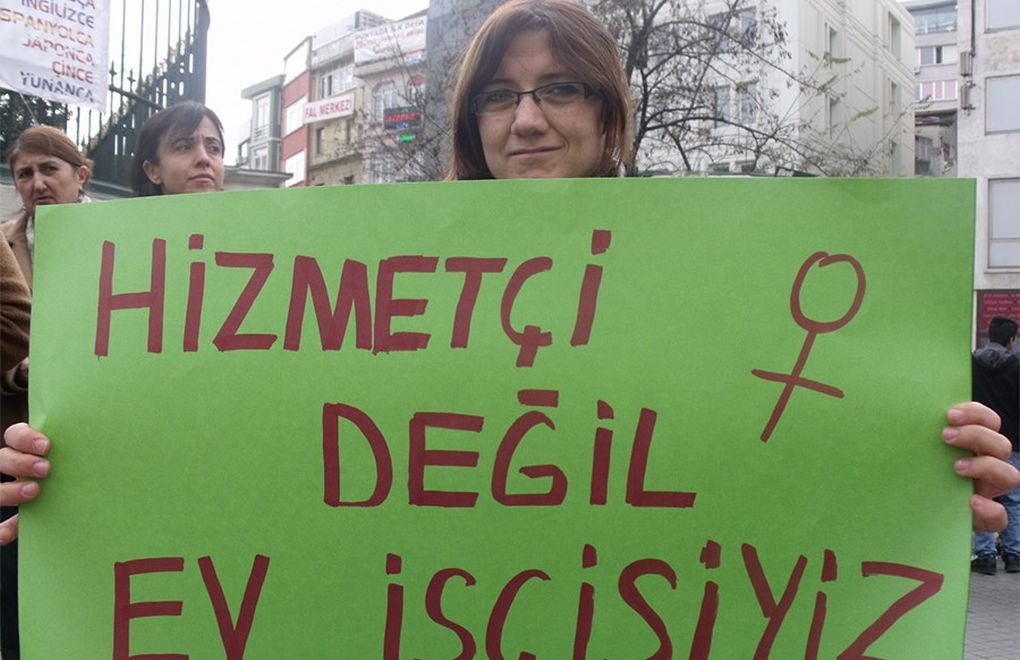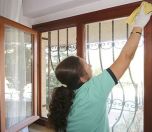"We are not servants, we are domestic workers"
Click to read the article in Turkish
"I'm from Uzbekistan. I've been working for an elderly couple for two years and a half. I don't have a work permit. I want to write about an important problem I experienced at my place of work. I went to the post office to pick up my residence permit. I didn't go there by bus but the private driver of my place of work took me there, yet still I was imprisoned in my room for a week for fear of spreading the virus to them. I continue to be imprisoned and food is placed outside of my door. I can't stand this any longer. I'm thinking about quitting. I don't know what might happen to me if I asked to quit. I'm very upset, this is no way to treat a human being."
Domestic worker, high school graduate, 2.5 years of experience
"Everyone's afraid, no one will hire us... My son was working, but his work was reduced to three days a week... Would you believe there were days we couldn't get even macaroni to eat?"
Primary school graduate, 20 years of occupational experience
"Of course we can't... How can we eat healthily? You can have a life only if you have the money..."
Domestic worker, primary school graduate, 10 years of experience
"I'm not working, we can't pay the rent or the bills. What will become of us? We're living through dark times... All we can do is pray..."
Domestic Worker, primary school graduate, 30 years of experience
The above personal experiences are from a recent report released by the Trade Union of Domestic Workers' Solidarity (EVİD-SEN).
"The Report on Problems Faced by Domestic Workers During the Pandemic in the Context of Violations of the Right to Work and Other Rights" was shared with the public in an online meeting held by union chair Gülhan Benli, domestic worker Arzu Çelebi and one of the writers of the report Ceyhun Güler yesterday afternoon (January 6).
While the union has also prepared informative leaflets for domestic workers and employers, they have been published in Turkish and English.
They could not pay their rent
Some highlights from the report are as follows:
"56.8 percent of respondents to the survey said that they had been laid off during this period. 5.2 percent of domestic workers were put on unpaid leave during the pandemic. Furthermore, 91.6 percent of domestic workers stated that they had experienced loss of income during this period.
"90.3 percent of the participants said that there were other members in their households who had also become unemployed.
"70.4 percent of the domestic workers participating in the study stated that they had not been able to pay the rent during the pandemic, while 86 percent reported not being able to pay their credit card debt and 83.1 percent not being able to pay back bank loans.
"43.3 percent of the participant domestic workers faced debt enforcement or property sequestration during the pandemic.
"83.7 percent of the participants in the survey held for this report stated that they worked without social security coverage and the majority of those working without social security worked day shifts.
"68 per cent of the domestic workers whocompleted the survey form stated that they were unemployed.
"83.5 percent of the domestic workers responding to the survey stated that they did not have adequate access to the right to health."
Click to read the full report in Turkish
Click to read the full report in English
'We expect concrete steps from authorities'
Union executive Benli briefly said the following in the meeting:
"We talked to the Ministries and authorities for the resolution of the problems; but, sufficient steps were not taken. We, as the union, want concrete steps to be taken to solve the problems of domestic workers.
"We want to have a meeting with the Ministry of Family, Labor and Social Services in the upcoming days. We want to reach out to the local governments and talk to them. How can we develop solutions together?
"We want to talk about this and take a step. We have taken all initiatives, concrete steps are necessary now. We are expecting these steps from the authorities. We can do this only together."
'We are not garbage cans, we want job security'
Domestic worker Çelebi also said: "We, as domestic workers, cannot benefit from our rights while using our right to work. We need legal support. We are not garbage cans, they treat us like objects.
"They cast slurs on us in places where we work. There are several examples like me. We cannot make our voices heard. We have our legal rights. We must also be recognized as workers. We want our rights to be granted as well. I have been doing this job for 35 years, but I have no guarantee.
"If they accept that we are workers, too, it will be much easier for the next generations. We also want to be recognized as an occupational group like nurses and doctors. I do not have social security, I have a green card [health card for uninsured people in Turkey].
"This is how I have solved my problem with healthcare, but there are thousands of domestic workers who cannot solve this problem."
Briefly about the methodology"This study uses the semi-structured in-depth interview technique and the focus group discussion, which are among the qualitative data collection methods in the social sciences, and the survey technique, as quantitative data collection methods. This is intended to confirm the quantitative findings with qualitative findings based on domestic worker's testimonies and thereby to increase the reliability of the study. The document examination method was also featured to ensure more comprehensive and rich inferences. In addition, to provide an international comparative perspective on the problems emerging with the pandemic, the recording of the Evid-Sen webinar was transcribed and the views of the participants were analysed to present a meaningful whole. "As part of the survey method used in the study and based on estimates by trade unions whose membership includes domestic workers, the number of domestic workers in Turkey was taken to be more than one million. At a 95 percent confidence interval, the minimum number of surveys necessary to represent one million domestic workers was calculated at 384. Given the minimum number, it was ensured that 413 domestic workers completed the questionnaire. The questionnaire was formed electronically due to the impossibility of face to face communication during the pandemic period and was communicated to domestic workers through email, social media accounts and phone messaging. Data obtained from the questionnaires was analysed using the SPSS software package. "Domestic workers responding to the survey were observed to have participated from Istanbul, Bursa, Izmir, Ankara, Antalya and Adana, in order of proportion of participation. All participants were female domestic workers. 24.5 percent were in the 21-34 age group, 34.1 percent in the 35-44 age group, 22.6 percent in the 45-54 age group and 10.7 percent in the 55-64 age group. 20.1 percent of the participants were merely literate, 28.6 percent had attended primary school, 24 percent had attended middle school and 22.3 percent had attended high school. 64 percent of the participants stated they were married. 63 percent of those responding to the questionnaire were live-in domestic workers, 12.6 percent worked full time on day shifts while 24.3 percent worked part time in day shifts or irregularly. 29.9 percent of participants stated that they took on child care tasks, 21.2 percent that they cared for sick or elderly persons or persons with disabilities, and 48.2 percent that they undertook housekeeping tasks such as cleaning. 8.7 percent of the domestic workers who answered the questionnaire said they had been working as a domestic worker for less than 5 years, 26.4 percent for between 6 to 10 years, 33.2 percent for between 11 and 15 years, 26.9 percent for between 16 and 20 years and 4.5 percent for 21 years or longer. While 92.8 percent of the participants were domestic workers from Turkey, 7.3 percent were foreign migrant domestic workers." |
(EMK/SD)















